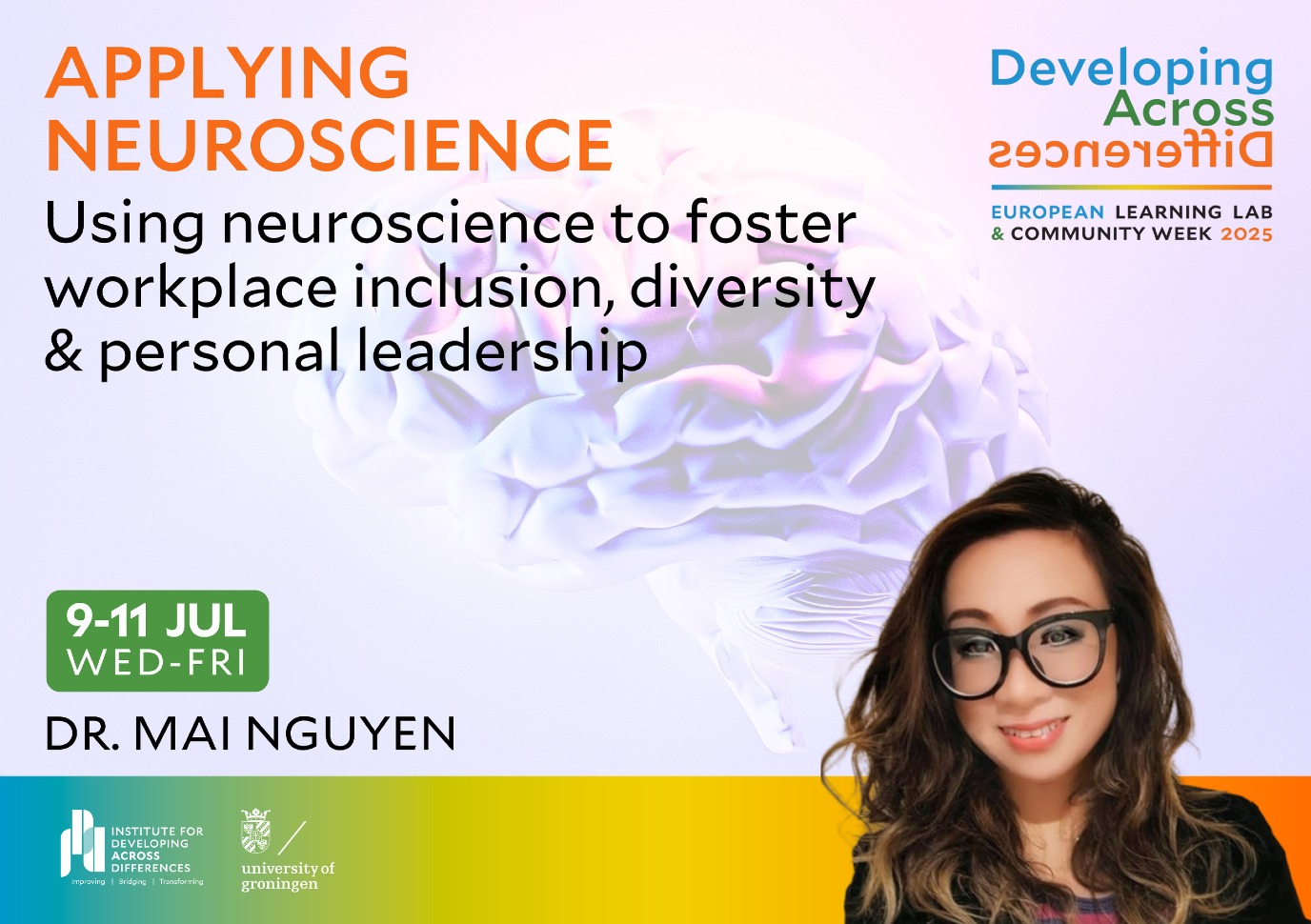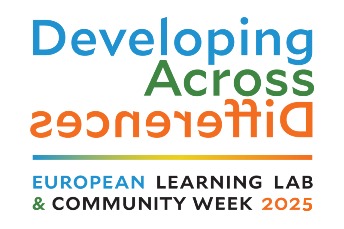Developing Across Differences: Applying Neuroscience

Applied Neuroscience and Brain Organisational Neuroscience are new disciplines, made possible only with recent technological innovations that offer scholars and practitioners new approaches for developing across differences.
Why should you attend?
This in-depth course examines how rather than relying on fear-based approaches (ref Hofstede’s statement that “Culture is more often a source of conflict than synergy. Cultural differences are a nuisance at best and often a disaster.”), workplaces and communities can instead apply neuroscience insights and Positive Organisational Scholarship (POS) to pursue personal leadership, inclusion and diversity efforts in order to reap its moral, social, and economic benefits.
Drawing from the emerging field of applied neuroscience and POS, the course provides fundamental, hands-on, and up-to-date knowledge and skill-building that helps you better understand how the brain works and how you can make it work for you—and help your clients do the same.
In being able to more critically reflect on theories and practices that have been the mainstream and see where they can be enriched or debunked with insights from neuroscience, you and those you work with will be able to create and improve workplace policies and strategies on bias management, diversity & inclusion practices, change management, intercultural communication, work-life balance, and personal development.
Practical information
|
Dates & location |
9 - 11 July 2025 Academy Building (Broerstraat 5) or Harmonie Building (Oude Kijk in Het Jatstraat 26) |
|
Level |
PhD/Postdoc/Practitioners May be appropriate for some MA students; contact the organisers for consultation about eligibility |
|
Fee |
€ 1550 |
|
Academic coordinators |
Dr. Mai Nguyen |
|
Contact |
ic rug.nl or info iddifferences.org |
Requirements
The DAD is for multipliers who help individuals, organizations and societies better recognize, appreciate and use differences as a way of better communicating, working and thriving together.
These are (in-house and external) trainers, educators, consultants, coaches, researchers, scholars, facilitators, HR staff, advanced-level (MA+) students, and professional development specialists with 5+ years of experience/study in the greater Differences field. Contact the organisers at ic rug.nl or info iddifferences.org for consultation about appropriateness and eligibility.
It is expected that the participants have a sufficient command of the English language to actively participate in the discussions and to present their own work in English.
This course is for you if are a mid- to senior-level in-house professional or consultant/trainer/multiplier/educator who helps those who:
-
are implementing diversity and inclusion initiatives within their organisations;
-
offer training and on-the-job professional development to help colleagues better communicate and collaborate;
-
work with those who appreciate “hard science”-based evidence for making system-wide and personal change.
Contact the organisers at ic rug.nl or info iddifferences.org if you have questions about the suitability of this course for your circumstances.
Learning outcomes
In this course, you will learn how to help yourself and those you work with so that you/they can better::
-
Critically appreciate neuroscience myths and realities and how the former may be erroneously incorporated into mainstream practices in the workplace and otherwise.
-
Articulate the fundamentals of neuroscience, including neuroplasticity, neurogenesis and epigenetics.
-
Understand cultural neuroscience connections, i.e. those between culture, cultural values, and acculturalisation with genes and brain using an interdisciplinary approach that fosters the potential of a multicultural mind.
-
Understand neuroscience’s role in learning and well-being, including mindfulness, workout, and mind-gut connection.
-
Apply insights from neuroscience to understand and work with biases and change management.
Course Approach
This course will blend cognitive discussions about key concepts and frameworks with applied independent learning based on your real-world cases as well as group discussions. You will have an opportunity to consider how you might apply the knowledge and strategies gained in this course with your clients.
18 hours of in-class learning and active participation using experiential methods.
Upon successful completion of the programme, the Summer School offers a Certificate of Attendance that mentions the workload of 18 hours (28 hours corresponds to 1 ECTS). Students can apply for recognition of these credits to the relevant authorities in their home institutions, therefore the final decision on awarding credits is at the discretion of their home institutions. We will be happy to provide any necessary information that might be requested in addition to the certificate of attendance.
Course Schedule
Sunday, 6 July
15.00-18.00 Optional networking event
Wednesday, 9 July - Friday, 11 July
09.00-17:30
Learning approach
This course will blend cognitive discussions about key concepts and frameworks with applied independent learning based on your real-world cases as well as group discussions. You will have an opportunity to consider how you might apply the knowledge and strategies gained in this course with your clients.
Introduction to lecturer

Dr. Mai Nguyen
Dr. Mai Nguyen is an author and, until recently, associate professor at Amsterdam School of International Business where she specialises in cross-cultural management. In addition to PhD in intercultural communication, she has a Master’s degree from King’s College London on Applied Neuroscience and a Master in Educational Science and Curriculum Design from Twente University.
Mai is widely known for bridging intercultural communication and neuroscience in organizational settings, and making these complex concepts accessible to practitioners in academic and corporate settings alike.
In addition to two textbooks that are currently used in universities worldwide, Intercultural Communication: When Neurons, Genes, and Evolution Joined the Discourse (Amsterdam University Press) and Cross-Cultural Management with Insights from Brain Science (Routledge), she is an active researcher.
Application procedure
|
Registration deadline |
Regular registration closes on 3 May 2025.
Late registration closes on 1 July 2025. |
|
Date of selection
|
Within 72 hours following registration, you will be contacted directly by the organisers about your application. |
|
Application
|
Participants submit payment and details about their interest at the link below. They will be contacted directly by the organisers about their experience and the suitability of the course. |
Please note that as all courses are subject to meeting minimum enrolments, the DAD team will confirm on or before 19 May 2025 that your course is taking place. We strongly advise you not to book non-refundable travel until you have received this confirmation. In all cases, refunds for courses are not available except in the case of course cancellation by the DAD organisers. In the case that your preferred course is cancelled, you are welcomed to enroll in an alternative course or request a refund. You will be notified on or before 19 May 2025 if the DAD course is cancelled. This policy is different from that of other University of Groningen Summer School and Language Centre courses. Full details are available on the Developing Across Differences (DAD) Learning Lab & Community Week Terms and Conditions page.


| Last modified: | 26 February 2025 2.43 p.m. |
